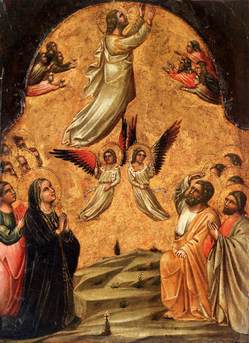
What is the consistent, clear teaching of the Church, that is, what has been taught down through the ages, about the Ascension of the Lord? What does it mean for the Lord to "ascend" to the right hand of God the Father? Does he actually go up into the heavens?
The Gospel of Luke tells us that Jesus blessed his disciples and then "parted from them and was taken up to heaven." And the Acts of the Apostles tells us that the disciples witnessed the Lord's ascension. So, the Scripture relate to us that Jesus' ascension was a public act which we too, follow according the Father's will.
Let me be crystal clear about the teaching: the ascension of the Lord is not only concerned with Christ's humanity; the ascension of the Lord is also about our humanity ascension to God's right hand in glory.
You will want to read--NO, you must read and re-read Credo for Today by Joseph Cardinal Ratzinger (Benedict XVI) pp 90-94. It is the best of the Church's contemporary theological reflections on this point of our faith.
Pope Saint Leo the Great (+461) taught, "Truly it was a great and indescribable source of rejoicing when, in the sight of the heavenly multitudes, the nature of our human race ascended over the dignity of all heavenly creatures, to pass the angelic orders and to be raised beyond the heights of archangels. In its ascension it did not stop at any other height until this same nature was received at the seat of the eternal Father, to be associated on the throne of the glory of that One to whose nature it was joined in the Son" (from a homily on 1 June 444).
And just a year later Saint Leo says, "This Faith, reinforced by the Ascension of the Lord and strengthened by the gift of the Holy Spirit, has not been terrified by chains, by prison, by exile, by hunger, by fire, by the mangling of wild beasts, nor by sharp suffering from the cruelty of persecutors. Throughout the world, not only men but also women, not just immature boys but also tender virgins, have struggled on behalf of this Faith even to the shedding of their blood. This Faith has cast out demons, driven away sicknesses, and raised the dead" (from a homily on 17 May 445).
In the Catechism of the Catholic Church we read, "This final stage stays
closely linked to the first, that is, to his descent from heaven in the
Incarnation. Only the one who 'came from the Father' can return to the Father:
Christ Jesus. 'No one has ascended into heaven but he who descended from
heaven, the Son of man.' Left to its own natural powers humanity does not have
access to the 'Father's house', to God's life and happiness. Only Christ can
open to man such access that we, his members, might have confidence that we too
shall go where he, our Head and our Source, has preceded us" (661).


Thank you for this reflection and for the recommendation of Credo for Today. Your essay is being added to a collection of such that I'm creating that might be used for adult catechesis. Best wishes and prayers for your continued formation.
Many thanks, Elizabeth.
PAX